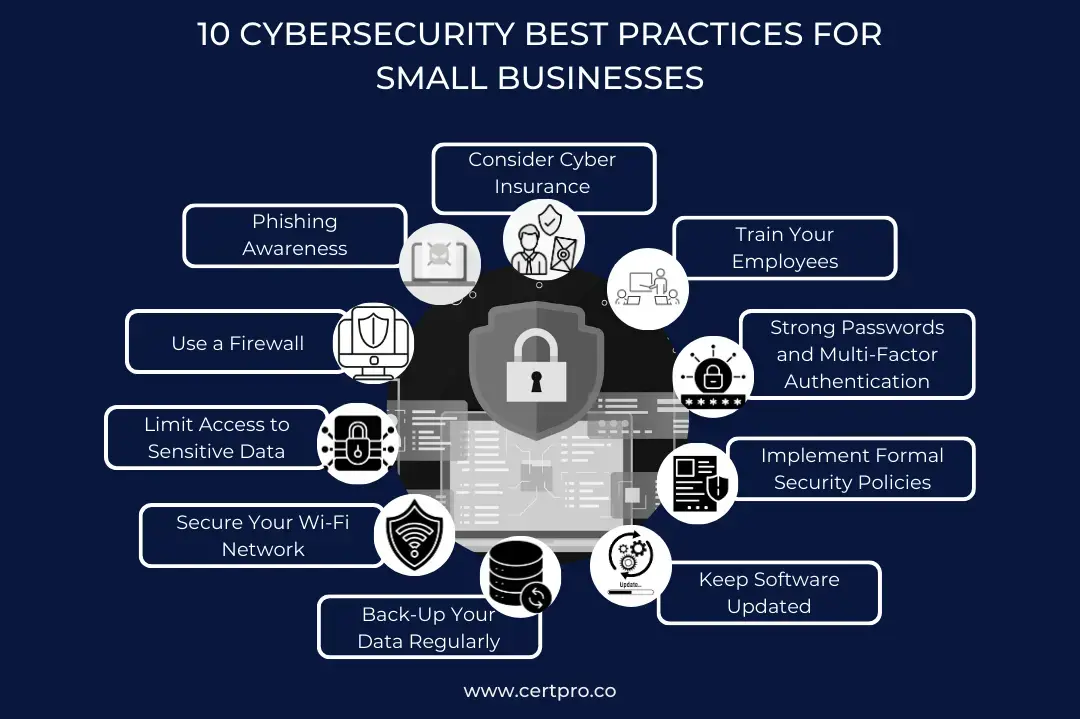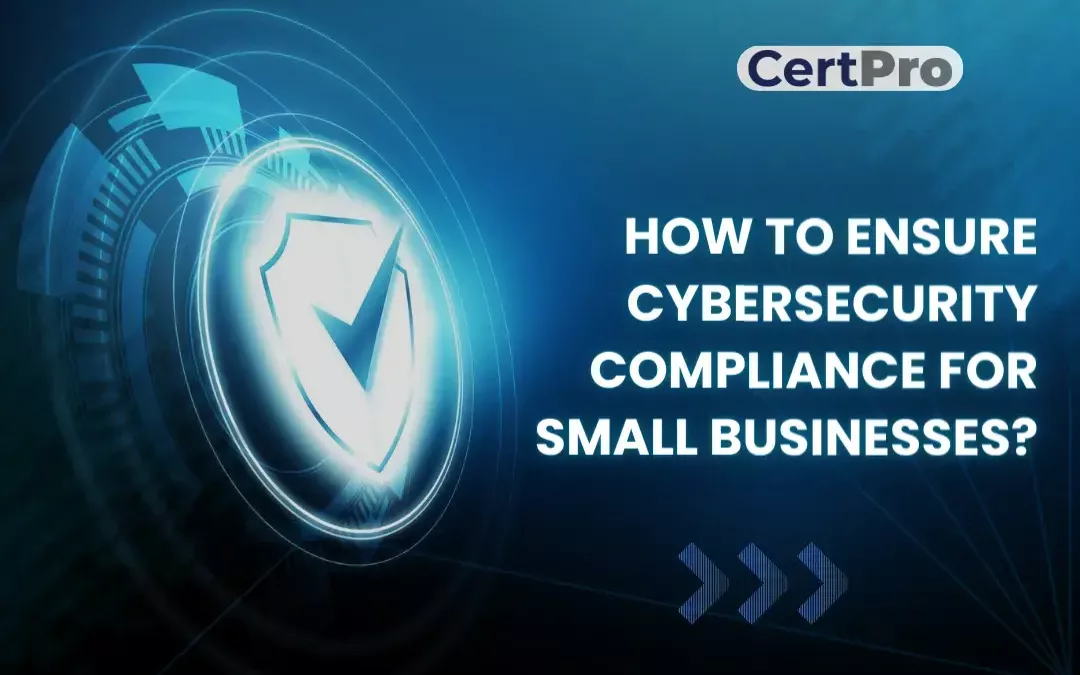In today’s digital landscape, small businesses are always concerned about cyberattacks. In the case of cyberattacks, it is difficult for them to survive. Therefore, the organization might face financial losses, and people might not trust them anymore. Thus, small businesses need to give cybersecurity compliance a top priority. It will prevent cyberattacks in the fast-paced digital landscape. Furthermore, it is well-recognizable that cyberattacks can cause significant damage to small businesses. Hence, the incident can cause significant, long-term problems in small businesses. The situation is unacceptable for small organizations as they might need help sustaining crises.
Therefore, small businesses should incorporate cybersecurity compliance to ensure strong protections against cyber threats. Hence, security measures include backups of crucial data, firewalls, and antivirus programs. Thus, training employees on cybersecurity best practices and regularly monitoring security issues is vital. So, small businesses need to be more cautious and do their best to protect their data from hackers.
IMPORTANCE OF CYBERSECURITY FOR SMALL BUSINESSES
Cybersecurity is an essential aspect for both small and large-scale business organizations. Here is discussed about the importance of cybersecurity for small business in brief:
1. Protection from Financial Losses: Data breaches negatively impact an organization’s financial condition. In addition, meaningful data like customer information, money records, and innovative ideas can be exposed when a data breach occurs. Thus, it can cause significant consequences for businesses, including hefty fines, legal battles, and the potential for closure. That’s where cybersecurity measures are essential. They prevent these detrimental attacks, safeguarding the integrity and viability of the business.
2. Security Threats Target Everyone: Generally, hackers target small businesses more often because they need strong security measures. In addition, small businesses may need more financial resources to implement cybersecurity, making them more vulnerable to attacks. Additionally, these businesses often store valuable customer data without proper security. Therefore, small businesses are more susceptible to cyber-attacks.
3. Compliance with Regulations: Businesses must maintain security to keep customer data safe. Hence, these privacy rules ensure data privacy and prevent data exploitation. However, if businesses don’t follow cybersecurity rules, they can face serious consequences, including financial penalties and legal consequences. So, every business needs to have strong data protection measures.
4. Maintains Business Continuity: Cyber threats can disrupt companies’ growth. Therefore, businesses might experience lost productivity, poor revenue generation, and shuttered growth. Thus, small businesses need to incorporate cybersecurity compliance on a mandatory basis to prevent cyberattacks.
5. Builds Customer Trust: Data breaches can cause trust issues for the organization. Furthermore, customers avoid such organizations that are reliable for personal information. This loss of trust can seriously harm the business. Therefore, this may lead to a decline in customer loyalty and damage your organization’s reputation. Thus, prioritizing cybersecurity demonstrates to customers that their data is secured. In addition, this proactive approach helps retain customer trust and strengthens the business’s overall reputation. Hence, cybersecurity safeguards your business from financial losses, protects sensitive data, and ensures trust.
BENEFITS OF CYBERSECURITY COMPLIANCE FOR SMALL-SCALE BUSINESSES
Small businesses, despite not being large corporations, often face cyberattacks. Following cybersecurity rules can help small businesses in many ways. Therefore, it keeps them safe from data breaches and financial burdens and upholds the company’s reputation. Here are some significant benefits:
1. Ensure Data Security: Cybersecurity compliance helps safeguard sensitive data, including financial records, ideas, and customer information. Hence, the measures to prevent hackers from stealing private data.
2. Reduced Financial Burden: Data breaches are relevant to financial consequences. If any data breaches occur, the responsible company must pay a massive penalty for the unwanted events. It can interpret the functionality of the companies. Therefore, following cybersecurity compliance prevents these issues by safeguarding your data from malicious access.
3. Enhanced Reputation: Cybersecurity compliance ensures that the customer’s data are protected and safe during handling and storage. Thus, if you implement cybersecurity compliance for your organization, it will surely improve your reputation in the global market, and you can secure your place in competitive markets.
4. Reduce Legal Consequences: Businesses handling customers’ data and private information require multiple safety measures to ensure data security. Therefore, cybersecurity compliance ensures you meet these legal requirements and avoid fines.
5. Create Employee Awareness: Educate the employees about cybersecurity. Consequently, this will allow them to be more careful when handling the data. In addition, a multi-layer authentication process can also help in this regard.
6. Ensure Business Continuity: Following cybersecurity rules usually means making regular plans to prevent cyber threats. Furthermore, this helps your business return to normal and avoid the risk related to data breaches.
10 CYBERSECURITY BEST PRACTICES FOR SMALL BUSINESSES
Here are the top 10 cybersecurity best practices for small businesses:
1. Educate Employees: Employees are important to maintaining a company’s online security. Therefore, regular training in online safety is significant for employees and companies. It can help them to recognize and avoid email threats.
2. Implement Multi-Factor Authentication: Ensure that employees create and use strong passwords. Additionally, whenever possible, enable multi-factor authentication (MFA) for all accounts. Thus, MFA protects data from unauthorized access.
3. Implement Formal Security Policies: It is important to create and implement a written security policy for your organization. Consequently, this will streamline the whole process. Therefore, these policies should address risk assessment, password management, and reporting suspicious activity.
4. Software Upgradation: Outdated software is often vulnerable to security exploits. Therefore, make sure you regularly update all software on your devices. Thus, it helps to keep your devices safe from cyberattacks.
5. Back-Up Storage of Data: It is vital to save data backups regularly. In case of a disaster, such as a cyberattack, these backups help to retrieve data. Thus, keep these backups safe by storing them somewhere else, such as the cloud or another device.
6. Secure Wi-Fi Network: Protect your Wi-Fi network with strong WPA2 encryption. Therefore, change your network’s default name and password to something unique. You are also setting up a separate guest network for visitors so they can’t get access to your leading network.
7. Restrict Access to Sensitive Data: Not all employees need access to your company’s data. Therefore, ensure only some employees have the authority to access the data. Thus, implement and follow the least privilege principle in the organization. Then, it grants employees access only to the data they need to do their jobs.
8. Use Firewall: A firewall is like a security barrier for your computer’s network. Thus, it checks and controls incoming and outgoing traffic on your network. By doing this, a firewall can help prevent unauthorized access to your network and ensure safety.
9. Phishing Awareness: Hackers commonly use email scams to obtain login details and other information. Hence, train your employees to be aware of phishing scams and to report any suspicious emails to IT.
10. Consider Cyber Insurance: Cyber insurance is like a backup plan for your business. If you get hit by hackers, it helps pay for stuff like legal fees and telling customers about the problem. Thus, it’s an intelligent way to keep your company’s money and reputation safe if something wrong happens online.

STEPS TO IMPLEMENT CYBERSECURITY MEASURES FOR SMALL BUSINESSES
Here are some key steps to implement cybersecurity measures for small businesses:
1. Assess your risks and vulnerabilities
-
Therefore, maintaining an inventory of all your devices, software, and data storage systems is essential.
-
In addition, recognize the type of sensitive information your organization handles (customer data, financial records, etc.).
-
It is necessary to consider how a cyberattack could disrupt your operations.
2. Secure your devices and network
-
In general, upgrade your antivirus for systems. It will stop suspicious software from accessing your gadgets and scan them often.
-
You can also use firewalls on everything to block sneaky online visitors.
-
Ensuring that all the data-relevant passwords are strictly updated at regular intervals is crucial.
-
Keep everything updated with the latest security fixes to prevent the risk.
-
You can provide authorized access to your secure wifi.
3. Educate and empower your employees
-
Educate your employees about suspicious emails and threat links.
-
Inform them how to keep the passwords safe and secure while handling the data.
-
You can implement a protocol for handling data safely within the organization.
4. Backup your data regularly
-
Implement a regular data backup schedule to a secure offsite location.
-
Test your backups periodically to ensure they can be restored in case of a cyberattack.
5. Develop an incident response plan
-
Figure out what to do in emergencies like cyberattacks and data breaches.
-
Specifically, mention the job role. Decide who does what if there’s an attack.
-
You can seek expert help in implementing cybersecurity compliance in your organization.
Thus, small businesses face significant challenges in protecting their information in the global market. In addition, gradually increasing cyberattack incidents can harm the organization’s business and reputation. To avoid such mishaps, it is vital to follow cybersecurity regulations in your organization strictly. Hence, cybersecurity compliance helps prevent cyberattacks and protect clients’ sensitive information, which might help develop trust among stakeholders.
Small businesses need to make certain regulations to protect themselves. Lastly, they should teach their workers about staying safe online, make sure everyone has strong passwords and regularly saves their important information, have a backup plan for what to do if a data breach happens online, and guide them through the latest ways of cyber threats. So, through substantial cybersecurity compliance, small businesses can stay strong against online threats and keep their journey towards excellence.
FAQ
Do startups need cybersecurity?
Yes, startups need cybersecurity. Even small businesses can still be targeted by hackers. So, cybersecurity is essential for startups and small businesses to stay safe in this digital world.
What are some common mistakes that small businesses make regarding cybersecurity?
- Neglecting regular software updates.
- Failure to implement multi-factor authentication.
- Weak password practices
Which language is used in cyber security?
The language used in cybersecurity is Python. Python is the top choice in cybersecurity. It is prevalent and useful for a variety of roles in this field.
What if businesses don't use cybersecurity?
Operating without cybersecurity risks your business for data breaches, financial losses, and reputation damage. Protect your assets with cybersecurity measures.
Do I need a firewall for my business?
Yes, small businesses require firewalls. It protects them from online threats, safeguards important information, enforces rules, improves internet performance, and ensures remote access security.

About the Author
MOHAMMAD YASIN
Mohammad Yasin, Regional Manager in Jordan, is a cybersecurity specialist. With a dedicated focus on securing digital landscapes, he brings extensive experience in compliance and strategic cybersecurity measures to the forefront.
HOW DOES THE NIST CYBERSECURITY FRAMEWORK FUNCTION, AND WHY IS IT IMPORTANT?
Emerging cyber threats make cybersecurity an essential consideration for organizations handling and managing data. In this regard, the NIST cybersecurity framework applies to improving your cybersecurity program. It is a set of guidelines that helps improve your...
UNDERSTANDING ISO 42001: A GUIDE FOR RESPONSIBLE AI MANAGEMENT SYSTEMS
The invention of artificial intelligence (AI) has changed the operational processes of many industries. However, the rapid growth of technology increases ethical, security, and privacy-related concerns. Therefore, the International Organization for Standardization...
EUROPEAN UNION’S ARTIFICIAL INTELLIGENCE ACT: HOW THIS GROUNDBREAKING LAW AFFECTS YOUR BUSINESS
Nowadays, Artificial Intelligence (AI) is transforming our lives exceptionally well. AI is now streamlining healthcare services, providing virtual assistance, and fulfilling queries. Technologies have boons and curses. Similarly, AI creates many concerns about...




